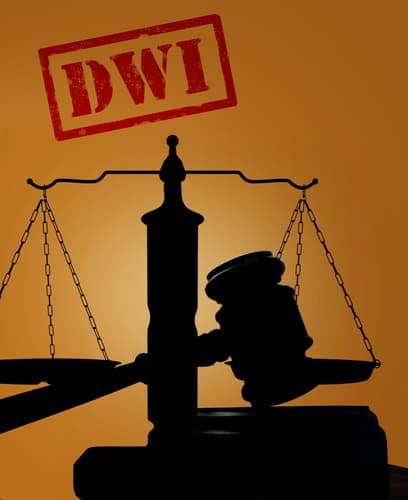
In Texas, an aggravated DWI refers to circumstances or conditions that exist in addition to the immediate DWI charge. The circumstances may include causing an accident while driving drunk, getting caught with an open container in the car, previous DWI convictions, or having a blood alcohol concentration (BAC) of 0.15% or higher.
These special circumstances can affect the way you are charged or convicted of the latest crime. Furthermore, they can impact your sentence. You may face a longer prison sentence, higher fines, extended driver’s license suspension, or more community service hours.
The Difference Between a DWI and an Aggravated DWI
The main difference between a DWI and an aggravated DWI is what you are charged with and convicted of.
DWI meaning
According to Section 49.04 of the Texas Penal Code, “a person commits an offense if the person is intoxicated while operating a motor vehicle in a public place.” If you are arrested and charged with driving while intoxicated, your charges typically end there. A typical scenario might include a police officer noticing that you are swerving on the road and pulling you over out of suspicion. You may be arrested based on your inability to drive the vehicle or a BAC test of .08 percent or higher.
DWI cases often include first-time offenses and only involve your impaired ability to drive or BAC level. Therefore, you will only be charged with drunk driving and no other offense.
Aggravated DWI
What distinguishes an aggravated DWI from a regular DWI is that you may be charged with more than just impaired driving or a BAC higher than .08 percent. You could also be charged with intoxicated manslaughter, multiple DWI offenses, or endangering a child while driving drunk.
In an aggravated DWI, you face multiple charges, not just the act of driving under the influence of alcohol. You could be looking at tougher penalties due to certain circumstances, even if you are charged only with a DWI and nothing else.
Penalties for an Aggravated DWI in Texas
The penalties for an aggravated DWI in Texas will vary depending on the circumstances of your arrest. Penalties in aggravated DWI cases may include:
- Up to $10,000 in fines
- Prison sentence of up to 10 years
- Driver’s license suspension
- Court costs
- Mandatory alcohol addiction treatment program
- An interlocking device on your car
- Lifetime DWI conviction on your record
In addition, the court may also impose a driver’s license annual renewal fee of up to $3,000 for three years, up to 600 hours of community service, and probation for up to six months. Each circumstance above the DWI charge could extend each penalty significantly.
Aggravating Circumstances in a Texas DWI
Some special circumstances that can lead to an aggravated DWI in Texas include:
Death or Injury
Perhaps the worst possible charge in a DWI-related case is intoxicated manslaughter or intoxicated assault. This means that someone was injured or killed as a result of someone driving drunk. Penalties can include a 20-year prison sentence and a fine of up to $10,000.
Multiple Offenses
Every time you are caught driving drunk within a certain timeframe, the penalties get tougher. Each offense causes you to incur a longer prison term, higher fines, and a longer driver’s license suspension. Plus, the state will impose new penalties that did not exist with the previous charge.
If a child under the age of 15 was in the car while you were drinking, you may receive up to two years of jail time and a $10,000 fine for endangering the child. The penalties come with a first-time offense.
Blood Alcohol Concentration
If your BAC was at least 0.15%, then you are nearly double the legal limit. This means that your ability to drive a vehicle is highly impaired. A sentence may include up to one year of jail time and a maximum fine of up to $4,000.
Getting Legal Representation for an Aggravated DWI Case
If you are arrested and charged with aggravated DWI in Texas, you may want to consult a DWI lawyer in Dallas, Texas. An attorney from our firm can review your case, investigate what happened, and make recommendations on how you should proceed. Lawyers can use their resources to get you the best possible outcome based on your situation.
Furthermore, if you are innocent of the charges, an attorney can gather evidence and speak with witnesses who may be able to testify on your behalf. A legal professional can work with you to develop a defense strategy tailored to your case and aim to get your charges dropped or reduced. They could also help you avoid harsher penalties and felony offenses and guide you through the legal process if you decide to enter a plea bargain.
A DWI Attorney Can Protect Your Legal Rights and Fight for You
Attorney Randall Isenberg has more than 30 years of experience handling DWI cases. He has served as a district judge and chief felony prosecutor during his decades-long career, so he brings years of experience with him when he works on your behalf. He and his team recently achieved these recent case results for clients facing criminal drunk driving convictions:
DWI 3rd Placed on Probation
DWI .15 Reduced to a Class B and placed on Deferred Probation
DWI Placed on Deferred Probation
DWI Placed on Deferred Probation
DWI .15 Placed on Deferred Probation
DWI Placed on Deferred Probation
DWI 2nd Reduced to Obstruction of Roadway and placed on Deferred Probation
DWI .15 Reduced to a Class B and placed on Deferred Probation
While each case is unique, our criminal defense lawyers work diligently to help people manage their cases after a drunk-driving arrest, whether they are first-time offenders or habitual offenders. We can look at critical evidence, review how law enforcement officers conducted your traffic stop and subsequent arrest, and other matters pertaining to your case.

Contact the Law Offices of Randall B. Isenberg
If you need legal services for an aggravated DWI, contact the Law Offices of Randall B. Isenberg. Our law firm offers legal representation for all types of DWI cases. Call us for a free case assessment during an initial consultation with a DWI attorney in Dallas, Texas.










